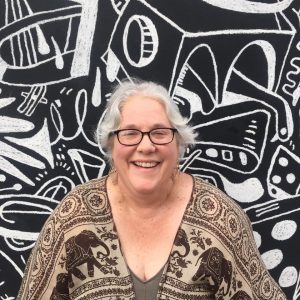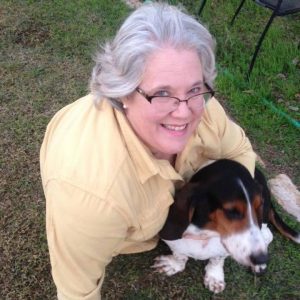By Walter Greene

Education has always been important to Jennifer Howell. With her mother being a teacher, she was introduced to the excitement surrounding learning at an early age. She’s since gone on to pursue her own career in education, having worked as a substitute teacher, after-school program leader, teacher’s aide, daycare teacher, youth activities leader, and senior adult activities director, teaching everyone from elementary students to adults and working across more than thirty different countries.
“I love learning. A lot of teachers will say that, but I love learning. I love it so much, I’m so enthusiastic about it, that I want to share it. . . . I feel like being a teacher is more a part of my personality, some kind of trait I was born with, rather than a teacher as a profession.”
While a love of learning has directed her career, it’s not by passion alone that Jennifer has come to value the role of education.
“My supervisor–head of the special education department–shared statistics with me regarding the correlation between low literacy and poverty, incarceration, health, and so much more. The importance of education was something I understood . . . But gaining a better understanding of the relationship–the statistics–of the impact of education on a person’s life made a profound impression on me.”
Knowing learning’s full potential for changing people’s minds and lives, Jennifer sees a natural connection between her work as an educator and her work as a disability advocate. With parents who both experienced disabilities, she’s always considered herself to be someone well-suited to the role.
“I felt like me of all people, I would be so sensitive and aware of the challenges that persons with disabilities face and the discrimination and their needs. And I was, I think, I was more so than the average person.”
Living with individuals with disabilities certainly imparts some empathy and understanding of the barriers and challenges that exist for them, but it wasn’t until Jennifer began living with her own disability that she gained the insight that drives her current advocacy.
“When it was me, when I was the one with arthritis, I was the one having trouble keeping up with others when we were walking together, or I was the one having trouble getting up and down the stairs or just not going somewhere at all because it was more than I could do physically. All of a sudden I started to notice things that I had never noticed before. It’s kind of embarrassing to admit that, but it’s true. You would think I would have noticed it before because of my parents or others but there really is something different about it when it’s you . . . You really start to notice some of the barriers that I hadn’t noticed before, at least not in the same way. There was that teacher thing in me, I wanted other people to know that you’re not thinking about the needs of others if you’re not providing access. You’re leaving a lot of people out by having barriers.”
At the core of advocacy is opening others’ minds to new ideas. This involves educating them in areas where a lack of understanding has fashioned misguided assumptions or where deep-set beliefs have calcified into hard barriers to progress for the people they affect. Jennifer believes that education, whether through art, writing, curriculum, or podcast, has the power to break apart this misinformation, leading to lasting change.
 “My mission is to make others aware, to educate others, that every day people are excluded from participation because buildings are not wheelchair accessible, events don’t provide an ASL interpreter, websites don’t employ accessible design. . . the list is endless. . . . I want people to be more aware of the millions of ways persons with disabilities are excluded and discriminated against every day. Persons with disabilities are unable to see, hear, attend many events due to inaccessibility. They’re not hired or promoted because it’s mistakenly assumed they cannot meet the job requirements. They’re gaslighted by persons who could not possibly know what it’s like to experience autism or schizophrenia or arthritis or using a wheelchair or being disabled after brain surgery.”
“My mission is to make others aware, to educate others, that every day people are excluded from participation because buildings are not wheelchair accessible, events don’t provide an ASL interpreter, websites don’t employ accessible design. . . the list is endless. . . . I want people to be more aware of the millions of ways persons with disabilities are excluded and discriminated against every day. Persons with disabilities are unable to see, hear, attend many events due to inaccessibility. They’re not hired or promoted because it’s mistakenly assumed they cannot meet the job requirements. They’re gaslighted by persons who could not possibly know what it’s like to experience autism or schizophrenia or arthritis or using a wheelchair or being disabled after brain surgery.”
Short of experiencing a disability for yourself, seriously listening to and engaging with the stories of individuals with disabilities is the next best thing when it comes to learning about and understanding the realities of living with a disability.
In true teacher spirit, Jennifer drives home the point that this room for learning is by no means limited to non-disabled persons.
“I wanted to show how that even a person with my experiences–living with and caring for loved ones with disabilities–still has plenty to learn about how to make the world more inclusive and accessible.”
Feeling motivated to learn? Listen to Jennifer host the Valentine’s Day special of the True Tales by Disability Advocates podcast, “A Love with no Limits” with guests Dave and Kate Chapple, available now on Spotify, Apple Podcasts, and wherever else you stream podcasts. For more, keep an eye out for the future episode, “A New Normal,” where Jennifer will share a story of her own about her journey from ally to advocate.

Walter Greene’s article is right. You have to be willing to learn, to look at things as they are without your ego in the way, which I think is Jennifer in spades.
That is so kind of you to say. Thank you.
That is so kind of you to say. Thank you.